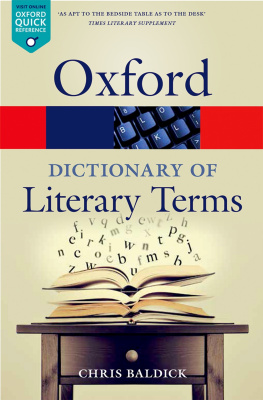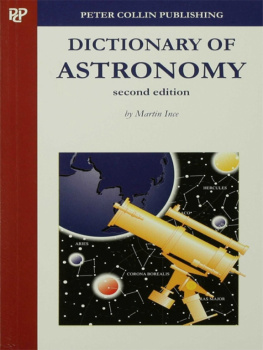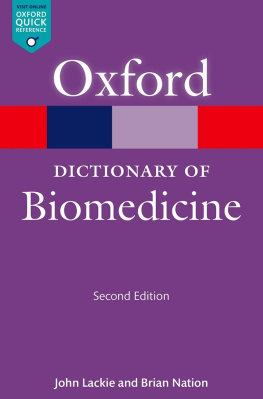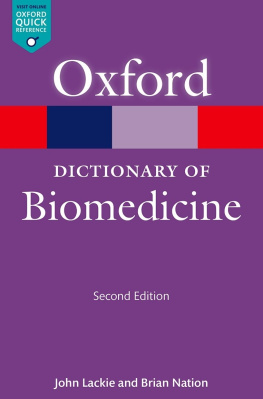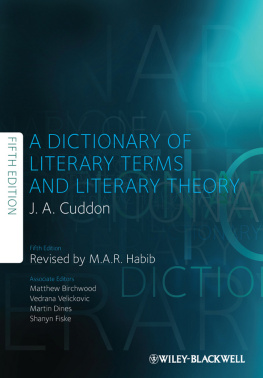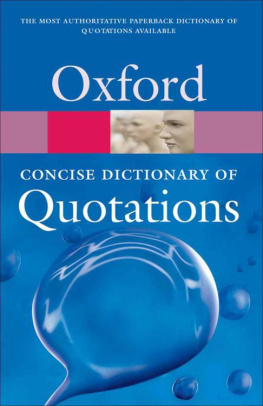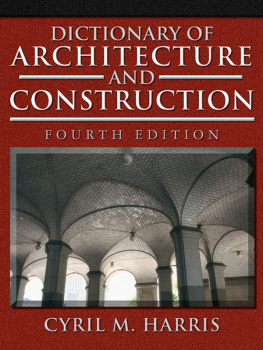While most e-readers can display special characters (such as and ), many cannot search for words containing them, unless the special characters themselves are typed into the search box. If you are unable to type these characters, please browse for your term using the .
OXFORD QUICK REFERENCE
The Oxford Dictionary of
Literary Terms
Chris Baldick is Professor of English at Goldsmiths, University of London. He edited The Oxford Book of Gothic Tales ( 1992 ), and is the author of The Oxford English Literary History, Volume 10 (19101940): The Modern Movement ( 2004 ), In Frankensteins Shadow ( 1987 ), Criticism and Literary Theory 1890 to the Present ( 1996 ), and other works of literary history. He has edited, with Rob Morrison , Tales of Terror from Blackwoods Magazine , and The Vampyre and Other Tales of the Macabre , and has written an introduction to Charles Maturins Melmoth the Wanderer (available in the Oxford Worlds Classics series).
For recommended web links for this title, visit www.oxfordreference.com/page/litterm

Great Clarendon Street, Oxford, OX2 6DP, United Kingdom
Oxford University Press is a department of the University of Oxford. It furthers the University's objective of excellence in research, scholarship, and education by publishing worldwide. Oxford is a registered trade mark of Oxford University Press in the UK and in certain other countries
Chris Baldick 1990, 1991, 2001, 2004, 2008, 2015
The moral rights of the author have been asserted
First published 1990
First published as a paperback 1991
Second edition published 2001
Second edition published with new covers 2004
Third edition 2008
Fourth edition 2015
Impression: 5
All rights reserved. No part of this publication may be reproduced, stored in a retrieval system, or transmitted, in any form or by any means, without the prior permission in writing of Oxford University Press, or as expressly permitted by law, by licence or under terms agreed with the appropriate reprographics rights organization. Enquiries concerning reproduction outside the scope of the above should be sent to the Rights Department, Oxford University Press, at the address above
You must not circulate this work in any other form and you must impose this same condition on any acquirer
Published in the United States of America by Oxford University Press 198 Madison Avenue, New York, NY 10016, United States of America
British Library Cataloguing in Publication Data
Data available
Library of Congress Control Number: 2014960115
ISBN 9780198715443
ebook ISBN 9780191044076
Links to third party websites are provided by Oxford in good faith and for information only. Oxford disclaims any responsibility for the materials contained in any third party website referenced in this work.
For Bethany
This is a book of hard words alphabetically arranged and briefly explained. It cannot purport to fulfil the functions of a balanced expository guide to literary criticism or to all literary concepts, nor does it attempt to catalogue the entire body of literary terms in use. It offers instead to clarify those twelve hundred terms that are most likely to cause the student or general reader some doubt or bafflement in the context of literary criticism and other discussion of literary works. Rather than include for the sake of encyclopaedic completeness all the most common terms found in literary discussion, I have set aside several that I have judged to be sufficiently well understood in common speech (anagram, clich, and many more), along with a broad category of general concepts such as art, belief, culture, etc., which may appear as literary-critical problems but which are not specifically literary terms. This policy has allowed space for the inclusion of many terms generated by the growth of academic literary theory in recent decades, and for adequate attention to the terminology of classical rhetoric, now increasingly revived. Along with these will be found hundreds of terms from literary criticism, literary history, prosody, and drama. The selection is weighted towards literature and criticism in English, but there are many terms taken from other languages, and many more associated primarily with other literatures. Many of the terms that I have omitted from this dictionary are covered by larger or more specialist works; a brief guide to these appears at pages 39192.
In each entry I have attempted to explain succinctly how the term is or has been used, with a brief illustrative example wherever possible, and to clarify any relevant distinctions of sense. Related terms are indicated by cross-reference, using an asterisk (*) before a term explained elsewhere in the dictionary, or the instruction see. I have chosen not to give much space to questions of etymology, and to discuss a terms origin only when this seems genuinely necessary to clarify its current sense. My attention has been devoted more to helping readers to use the terms confidently for themselves. To this end I have displayed the plural forms, adjectival forms, and other derived words relevant to each entry, and have provided pronunciation guides for more than two hundred potentially troublesome terms. The simplified pronunciation system used, closely based on the system devised by Joyce M. Hawkins for the Oxford Paperback Dictionary, offers a basic but sufficient indication of the essential features of stress-placing and vowel quality. One of its advantages is that it requires very little checking against the pronunciation key on page ix.
The dictionary in its present form is a thoroughly updated version of the third edition of 2008 , which itself was an expanded form of what was formerly the Concise Oxford Dictionary of Literary Terms ( 1990 , revised 2001 ). Concision remains, I trust, a virtue of the entries themselves, but there are now a further 200 of those, extending the books coverage not only of recently circulated terms but of modern critical and theoretical movements, schools of American poetry, Spanish verse forms, life writing, crime fiction, and much else. The provision of recommended reading has been extended widely, and is now accompanied in fifty entries by recommended web resources for further research.
My work on this dictionary and its predecessors has occupied me intermittently for more than twenty years, during which period I have incurred several debts of gratitude. From the start I was sustained by an inspirational editor at Oxford University Press, the late Kim Scott Walwyn, who first invited me to tackle this work, and whose enthusiasm and professionalism became legendary among the authors lucky enough to work with her. Wise counsel and well-directed advice came also at an early stage from Pamela Jackson, Harriet Barry, and John Simons, along with help on pronunciations from Michael Ockenden and Joyce Hawkins. Michael Hughes, Colin Pickthall, and Hazel Richardson came generously to my aid for particular entries in the first Concise edition. More lately, as I have brought the work up to date, it has benefited from the expertise of many of my colleagues past and present at Goldsmiths, who have borne sudden interrogation cheerfully. These are Alcuin Blamires, Lucia Boldrini, Michael Bruce, Marie-Claude Canova-Green, Helen Carr, Josh Cohen, Elizabeth Crossley, Rick Crownshaw, Hayley Davis, Alan Downie, Russ McDonald, Philip McGowan, Tim Parnell, Jacqueline Rattray, Michael Simpson, and Catherine Spooner. Annika Lindskog has also kindly provided advice on Swedish orthography for this 4th edition.

